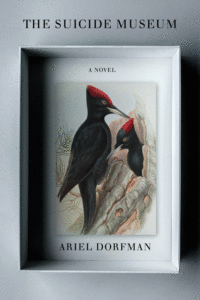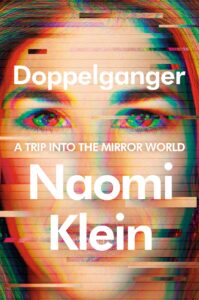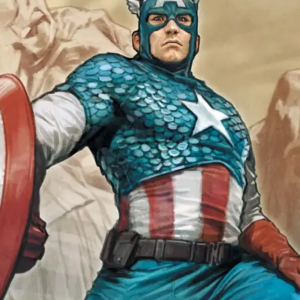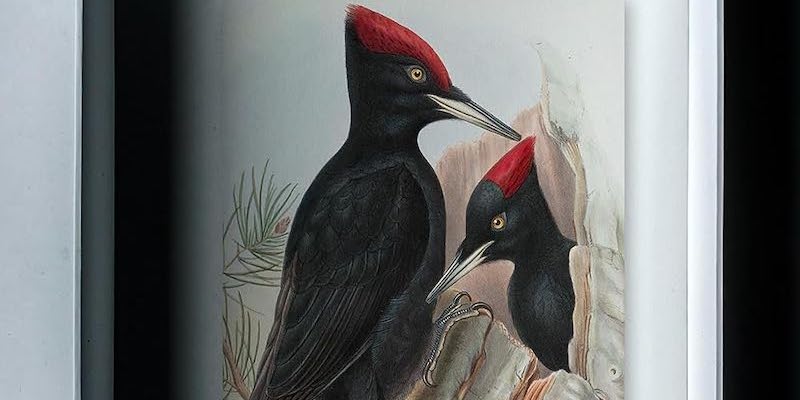
5 Book Reviews You Need to Read This Week
Andrea Long Chu on Zadie Smith, Jonathan Dee on Ariel Dorfman, James Wood on George Eliot, and More
Our five-alarm fire of fantastic reviews this week features Andrea Long Chu on Zadie Smith’s The Fraud, Jonathan Dee on Ariel Dorfman’s The Suicide Museum, Laura Marsh on Naomi Klein’s Doppelganger, Dwight Garner on Tracy Daugherty’s Larry McMurtry: A Life, and James Wood on Clare Carlisle’s The Marriage Question.
Brought to you by Book Marks, Lit Hub’s “Rotten Tomatoes for books.”
*
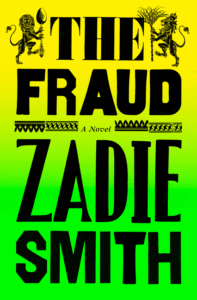
“Zadie Smith’s first book, White Teeth, was the English comic novel on bath salts…All the while, one never lost sight of Smith herself, bursting with exuberance and sincerity … A novelist has a sacred right to hate her first novel, but White Teeth remains by far the best thing Smith has ever written; what bad luck to have done it by 24! Smith has apparently concluded that White Teeth’s greatest strength, its audacious unreality, was in fact its fatal flaw. Today, she is firmly within the realist camp despite her recurring feints at departure. Her much-debated 2008 essay ‘Two Paths for the Novel,’ which pitted the ‘lyrical realism’ of Balzac and Flaubert against the 20th-century avant-garde, reads now like two paths for Zadie Smith. Every time she has set out down the second path, it has looped consolingly back into the first … Her two paths for the novel have become a perfect circle: What could be more avant-garde in an age of data harvesting and identity politics than a heartfelt 19th-century novel? The socially minded Eliot believed that through sympathetic portraits of ordinary people, the novel could provide readers with ‘the raw material of moral sentiment.’ With The Fraud, Smith delivers her most passionate defense of this idea to date. Whether it persuades is another matter … For Smith, the novel is just such an experiment in thinking beyond our closely held identities. It’s true that many bad novels have substituted ideology for interest. It’s equally true that Smith envisions the novel as a little liberal machine for making more little liberals. ‘We hope all of humanity will reject the project of dehumanization,’ she wrote in an essay on Toni Morrison last year. ‘We hope for a literature—and a society!—that recognizes the somebody in everybody.’ Fine words! But they are all gums, and no white teeth … The irony of Smith’s career is that she has never actually excelled at constructing the kind of sympathetic, all-too-human characters she advocates for … Their studied ordinariness makes us long for Smith’s true strength, which lies not in character but in voice. We read her because she possesses that rare and precious gift of sounding always like herself … For any novelist, there exists a small number of historical problems that, for reasons of luck and temperament, she naturally grasps as the stuff of life. The genius lies in knowing which ones they are.”
–Andrea Long Chu on Zadie Smith’s The Fraud (Vulture)
“Feels like a valediction to a career that, until now, has been varied in its instruments but consistent in its vision. The Suicide Museum can legitimately be described as autofiction; Dorfman himself is the narrator and central character, and a vast array of other people appear under their real names, including his wife and children and parents and a host of Chilean political figures, along with Jackson Browne and Christopher Reeve and Gabriel García Márquez. The book is set largely in the nineteen-nineties, and its focus is on the day in 1973 when La Moneda, Allende’s Presidential palace, was stormed. (Dorfman himself—by providential circumstances that also provoked a lifelong guilt—should have been present then but was not.) It is, however, also a novel that looks toward the future, and wrestles anew with Allende’s legacy and its relevance in a world whose sense of crisis, fifty years later, has been reframed … The billionaire, as a character, is having a moment in contemporary fiction. The ascendant trope seems to be that there is nothing of which a billionaire is not capable, which makes such figures sinister but also exquisitely useful in plot terms. Their combination of endless resources and psychological deformity means that you can use them to make anything happen. Even in the most naturalistic settings, they wander freely beyond the borders of realism … In a novel filled with real-life figures and events, Hortha gradually begins to read as a tragicomic avatar of Dorfman’s own late-in-life struggle to reconcile ideas that don’t fit together comfortably but that he cannot abandon: a ghost let loose in a memoir … He insists that the myth of Allende retains its utility, even in a world the man himself wouldn’t recognize.”
–Jonathan Dee on Ariel Dorfman’s The Suicide Museum (The New Yorker)
“This story of mistaken identity would on its own be gripping and revealing enough, both as a psychological study and for its explorations of the double in art and history, the disorienting effects of social media, and the queasy feeling of looking into a distorted mirror. But the larger subject of Doppelganger turns out to be a far more complex and consequential confusion: Its guiding question is how so many people have in recent years broken with conventional left-right political affiliations and a shared understanding of reality, and crossed over into the ‘Mirror World,’ a realm of ‘uncanny people’ and ‘upside-down politics’ where facts are arbitrary and people who still advertise themselves as liberals can make common cause with conspiracists and fascists. The Naomi-Naomi story is more than a generous and capacious reflection on being taken for someone else; it is also the frame for a uniquely astute account of the scrambled political formations that have come out of the pandemic … One of the strengths of Klein’s book is the clarity with which she traces the composition of the ‘strange-bedfellow coalitions’ that have coalesced since the pandemic, encompassing the traditional right and the conspiratorial hard right … Doppelganger could have followed the contours of so many stories of doubles and stolen identities and evil twins, in which the goal is chiefly to unmask the impostor; with the doppelgänger vanquished, order is restored, and all is well again. Klein is clear that this story is not that simple: Even if we could banish misinformation, we would still be left with a series of social, political, and environmental crises that have gone largely unaddressed in government—hardly a vision of equilibrium. A major reason why the distortions and evasions of the Mirror World have appealed to so many people is that the baseline of political health in the United States today is so very low.”
–Laura Marsh on Naomi Klein’s Doppelganger: A Trip Into the Mirror World (The New Republic)
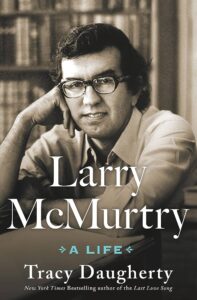
“McMurtry…was a demythologizer of the American West who appeared to live in several registers at once. On the one hand, this biography suggests that his life was rather deluxe. He was the American president of PEN, the literature and human rights group. He ate caviar at Petrossian with Susan Sontag…On the other hand, he’d grown up on a ranch. The ochre mud never entirely came off his boots, nor did he want it to. He wasn’t entirely comfortable on the coasts. He was a sloppy dresser; his belts tended to miss some loops. He loved Fritos, Dr Pepper, peanut patties and Hershey’s chocolate bars. He had a method with the Hershey’s bars. He liked them warm. He’d let them melt on his car’s dashboard while driving, then lick the goo off the wrapper … The antic side of his personality means that Daugherty’s book, Larry McMurtry: A Life, reads a bit like one of McMurtry’s novels. Elegy and humor bleed into each other … [Daugherty] is the right person for this job, perhaps too much so. If his book has a fault, it’s that Daugherty tries to out-McMurtry McMurtry. His sentences get awfully loose and folksy…and this quality tempted me to sink in my own seat the way McMurtry did in that movie theater. I decided not to let it bother me, and you shouldn’t either, because he does everything else well … McMurtry was recognized, during his lifetime, as an important American writer. He won a Pulitzer Prize (for Lonesome Dove) and an Academy Award (for writing the Brokeback Mountain screenplay with his frequent collaborator Diana Ossana). He matters because of how closely he observed declining ways of life, and he intimately charted the national migration from rural to urban existence. But as he pointed out, in a letter to his friend Ken Kesey, the author of One Flew Over the Cuckoo’s Nest, his books worked because of the attention paid to character: ‘For me the novel is character creation. Style is nice, plot is nice, structure is OK, social significance is OK, symbolism worms its way in, timeliness is OK too, but unless the characters convince and live the book’s got no chance.’”
–Dwight Garner on Tracy Daugherty’s Larry McMurtry: A Life (The New York Times)
“George Eliot sometimes bores me, especially the George Eliot draped in greatness. Think of the extremities of nineteenth-century fiction: labile Lermontov; crazy, visionary Melville; nasty, world-hating Flaubert; mystic moor-bound Brontës; fanatical, trembling Dostoyevsky; explosive Hamsun. There’s enough wildness to destroy the myth of that stable Victorian portal ‘classic realism.’ It was not classic—certainly not then—and not always particularly ‘real.’ Instead, it was a storm of madness, extravagant allegory, tyrannical ambition, violent religiosity, violent atheism. Amid this tableau, at the calm median of the century’s religious belief and its unbelief, is wise, generous George Eliot: the saintly oracle consulted and visited by young Henry James and many other important admirers … It was this George Eliot whom Virginia Woolf had in mind when she wrote, in 1919, that the long-faced, oracular Victorian had become, for Woolf’s generation, ‘one of the butts for youth to laugh at’ … Even now, in a world of quite different pieties, it can be difficult to disinter George Eliot from our reverence, to rediscover the writer who had enough radical daring and agnostic courage to take on the whole sniffing righteousness of Victorian England. Clare Carlisle’s eloquent and original book, The Marriage Question: George Eliot’s Double Life, allows us to do that, by placing at the center of her inquiry the abiding preoccupation and scandal of George Eliot’s life and work: marriage … Carlisle vividly animates this dangerous writer, and sets before us, in her early chapters, the young woman of letters before she became ‘George Eliot’ … Carlisle, a philosopher who has written studies of Spinoza and Kierkegaard, combines a biographer’s eye for stories with a philosopher’s nose for questions. Her masterly and enriching study is based, I think, on two related premises: that marriage is a private story, about whose intimacies we can only speculate (novels, of course, and George Eliot’s novels preëminently, dramatize those intimacies for us); and that marriage is also a public story, a constantly adjusted fable, the propaganda that a household needs in order to run its little polity.”
–James Wood on Clare Carlisle’s The Marriage Question: George Eliot’s Double Life (The New Yorker)
Book Marks
Visit Book Marks, Lit Hub's home for book reviews, at https://bookmarks.reviews/ or on social media at @bookmarksreads.










